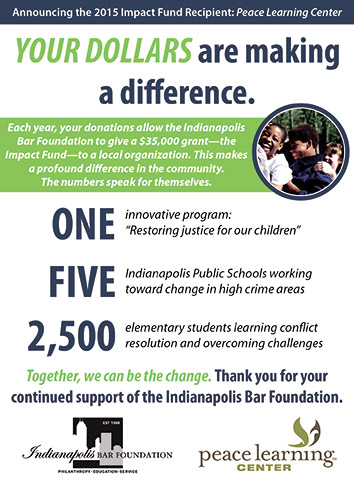Subscriber Benefit
As a subscriber you can listen to articles at work, in the car, or while you work out. Subscribe NowWith help from the Indianapolis Bar Foundation, more than 2,500 local school children will gain access to critical conflict resolution skills through an innovative Restorative Justice program spearheaded by Peace Learning Center (PLC). PLC was recently named the recipient of the Indianapolis Bar Foundation’s 2015 Impact Fund grant, which will provide $35,000 in funding to make this essential program possible.
“We are proud to announce that the recipient of its 2015 Impact Fund Grant is The Peace Learning Center. PLC will use the Impact Grant funds to implement a Restorative Justice project at five deserving Indianapolis Public Schools. The project focuses on repairing harm done by student misconduct by using non-adversarial interventions to foster and build relationships among students, lawyers, educators, and parents,” says Erin A. Clancy of Kightlinger & Gray LLP and 2015 president of the Indianapolis Bar Foundation.
“We look forward to partnering with PLC and the positive changes to be realized through their program. The Indianapolis Bar Foundation thanks its generous donors, sponsors, and Fellows, whose support, dedication, and active involvement have enabled us to effectuate meaningful impact for individuals in Indianapolis and our community as a whole.”
The Restorative Justice program will be launched at five Indianapolis Public Schools elementary schools this October and will run through June 2016. The program is designed to be self-sustaining after the first year. Schools included in the program serve neighborhoods that have been identified as high priority areas due to crime and other factors. Residents in these neighborhoods are six times more likely to be victims of a crime than residents in other Indianapolis neighborhoods.
Restorative Justice strategies have been proven to improve school environments and enhance learning as they reduce disruptive behaviors and the need for exclusionary discipline. Restorative Justice seeks to build positive relationships by implementing non-adversarial interventions with the student in front of a support team panel.
Currently, many IPS schools rely on exclusionary discipline methods, such as suspension and expulsion, which have been proven to increase risk factors for students at school and in their futures. School administrators state that they need realistic alternatives to suspensions and expulsions because they recognize the negative effects of exclusionary discipline methods on their students and school cultures.
About the Indianapolis Bar Foundation & the Impact Fund
The Impact Fund began in 2011 as a vehicle to maximize the financial generosity of Indianapolis Bar Foundation donors and to provide members of the Indianapolis Bar Association with compelling opportunities to donate their time through pro bono service. Since its inception, $175,000 has been awarded through the fund to organizations like the Joseph Maley Foundation, the Military Assistance Project of Indiana Legal Services Inc., Reach for Youth, and the Health and Human Rights Clinic at the Indiana University Robert H. McKinney School of Law in an effort to provide a significant positive impact in central Indiana through the promotion of access to justice for indigent persons.
The Impact Fund is an important tool in the foundation’s efforts to fulfill its mission: to advance justice and lead positive change in Indianapolis through philanthropy, education and service. In addition to the Impact Fund, the Indianapolis Bar Foundation grants $105,000 each year to a variety of community service programs co-sponsored with the Indianapolis Bar Association.
About Peace Learning Center
The Peace Learning Center of Indianapolis educates, inspires and empowers people to live peacefully. PLC’s vision is to build a community of peace where respect is primary and justice is real.
Since 1997, Peace Learning Center has reached more than 175,000 people locally and internationally. Peace Learning Center was created by a team, including its current executive director, that sought to reduce violence and increase kindness in the community. PLC works directly with schools, community nonprofits, businesses, juvenile correctional facilities, and faith groups to facilitate peace education sessions.
Please enable JavaScript to view this content.
